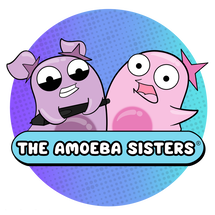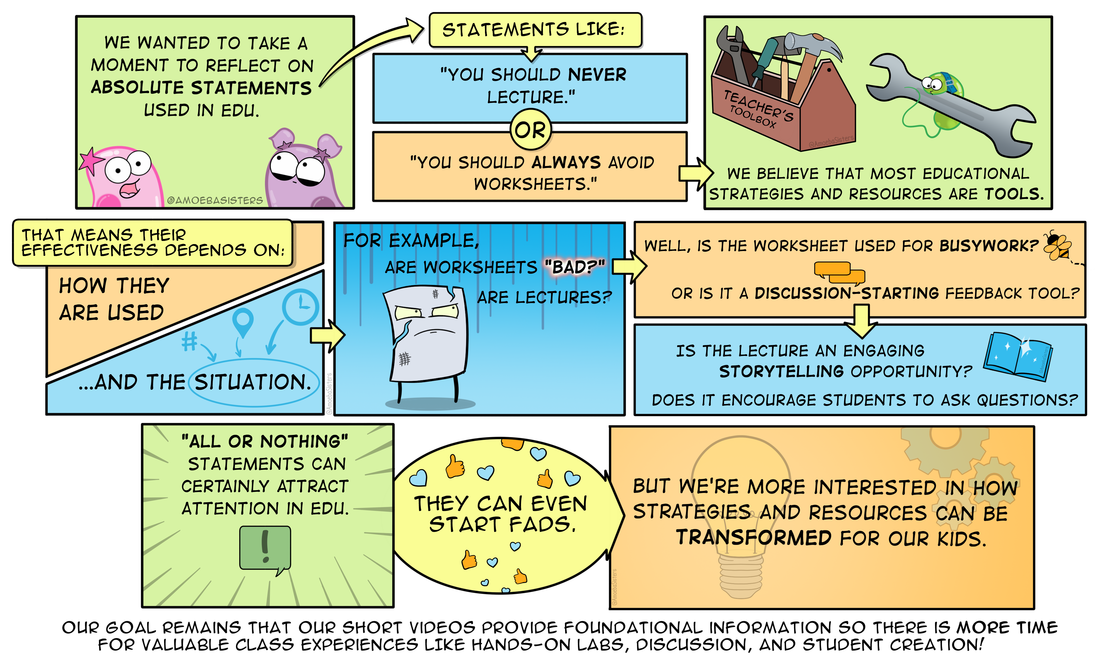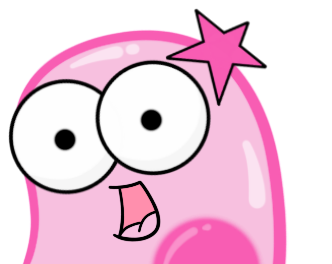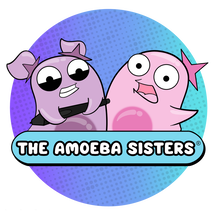|
Education is changing, and the way that we reach our students may need some transformation. When we were kids, the way we did our research consisted of going to the school library to read through the alphabetized encyclopedias. Now everything is often just a "Google" away. You can learn how to change a tire or master a video game on YouTube. There are a lot of ways to consume information now; it makes sense that we're all looking for ways to transform learning for our kids to use the information to create, solve problems, and ask their own questions.
But the absolute statements in education---those generalized statements that tend to classify everything in one category ---make us wary. They are not the answer. Absolute statements tend to be used to attack all lectures, all textbooks, all worksheets, etc. These statements tend to get a lot of attention; some come with their own Twitter hashtag and maybe even a book. The trouble with these statements is that they tend to classify everything in the category it attacks as the same. "You should never use lectures." "You should never use textbooks." "You should always avoid all worksheets." Edu videos are not in these statements (yet), but they could be soon. Because just like all tools---it matters how edu videos are being used too. We find these absolute statements are just attacking a tool without asking, "How is it being used?" Simply adding technology does not make something innovative; we all know this. But we also shouldn't innovate for the sake of innovation. We should innovate when the way something is being used no longer serves our kids as effectively. There should be a reason for transforming something besides the fact that the "something" may be an older tool or strategy. We aren't big fans of lengthy, traditional lecture and notes. We find them time consuming, and I've found my students tune out of them after about fifteen minutes. Plus, I have a lot less time for the other things I want to do such as labs and discussions! We made our Unlectured Series with the intention of transforming traditional lecture. But you will never hear us make an absolute statement about lectures, because we know they cannot all be generalized like mine. What about storytelling? This can be such a memorable way to connect with students! Or the TED Talks we love so much? These are all ways that lecture can be used in a way that can reach students. A paper-based or online textbook can be used in a monotonous task of having students copy vocabulary words with definitions straight from the book. Not very effective. But you know what else textbooks can be? A paper-based or online textbook could also be used as a reference tool----a peer-reviewed reference tool---that students can find useful to cite when developing their own creations such as a blog entry, story, or comic. Peer-reviewed information in science is important. A worksheet can be used as a sheet of paper where students restate facts that involves very little learning. Such things are easily copied online or from a peer. Worksheets can be meaningless busywork. It doesn't matter if it's on paper or behind glass on a computer screen---if it's being used that same way, its potential is the same. But you know what else worksheets can be? They can be full of open ended questions. They can serve as quick exit tickets, where they can let the teacher see where his/her students may be confused. They can provide an opportunity for feedback as a formative assessment with no grade required! They can be used collaboratively: have students pair up to come up with their answers and justify with the class. P.S. On the topic of worksheets, check out these other great points on this blog post by The Nerdy Teacher! Overall, lumping all things into a tool and calling the tool "bad" without considering how it's being used doesn't seem to make much sense to us. Any tool that is being used to help kids with the best part of science---the whole "doing" part of science including hands-on labs, discussions, creating, etc---is a win in our minds. Comments are closed.
|
About This PageThis page features some of Pinky's favorite instructional technology websites, apps, online resources, response systems, and other tools. Please always read the terms and privacy policy of any technology tool that you plan to use in the classroom.
Disclosure? If we share a tool or website on this page, it's because we like it and find it useful. We don't have affiliate links on this blog. If we use affiliate links at any point on this blog, we will announce on the individual post. Topics
All
|
Copyright © 2013-2024 Amoeba Sisters LLC
Terms of Use/ Press Kit/ Contact Us & Privacy Policy/ Support Us
Terms of Use/ Press Kit/ Contact Us & Privacy Policy/ Support Us




